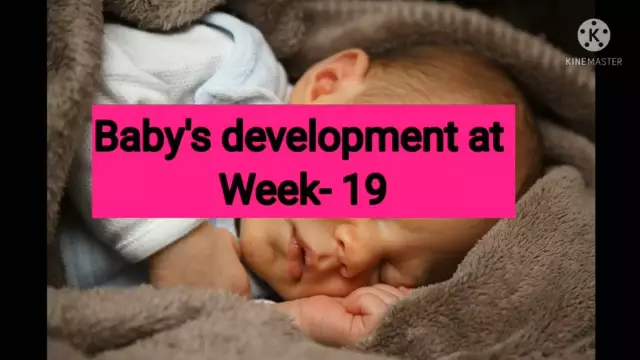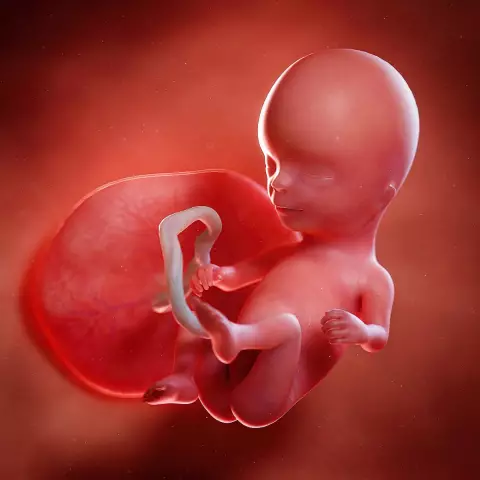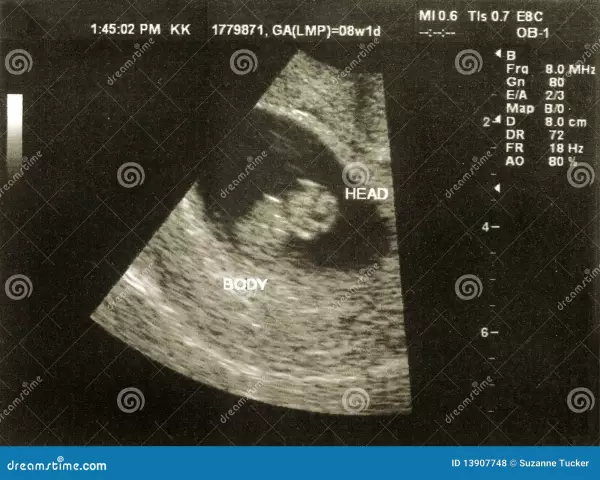- Author Rachel Wainwright wainwright@abchealthonline.com.
- Public 2023-12-15 07:39.
- Last modified 2025-11-02 20:14.
19th week of pregnancy

At a gestation period of 19 weeks, the unborn baby turns 17 weeks from the moment of conception, it is the fifth lunar month of its development.
Fetal changes
The fetus at the 19th week of gestation is about 15.5 cm long (the size is measured from the coccyx to the crown of the head) and weighs up to 250 g.
At an intensive pace at the 19th week of pregnancy, the central nervous system of the unborn child develops, the nerve cells of the brain matter take their permanent place, and the coordination of movements becomes more accurate.
In a fetus at the 19th week of pregnancy, the bronchial tree continues to branch out, smaller bronchi appear. But the lungs still do not function - the future baby is still receiving oxygen through the placenta.
The skin of the fetus is covered with soft fluff on the entire surface, with the exception of the palms and feet, the subcutaneous layer of adipose tissue becomes larger. Because of this, the blood vessels are less visible through the skin, and it looks less bright red.
In the folds of the skin, the product of the sebaceous glands accumulates - the original (cheese-like) lubricant. After the baby is born, it protects the skin from drying out, from losing excess moisture and pathogenic bacteria (it has bactericidal properties).
It was at this time that the rudiments of permanent (molar) teeth begin to form, they are located deep in the bone, under the rudiments of milk teeth. For these purposes, the fetus's body needs a lot of calcium and phosphorus salts. The digestive glands begin to function, and meconium, colored with bile, accumulates in the intestines.
Changes in a woman's body at the 19th week of pregnancy
The entire body of a woman is preparing for childbirth. To facilitate the passage of the fetus through the birth canal, the hip joints are already slightly relaxed by this time, so a woman may complain of back pain at the 19th week of pregnancy, especially in the lumbar region. To relieve pain at the 19th week of pregnancy, doctors recommend wearing low-heeled shoes, not being in one position for a long time, and monitoring your posture.
The maximum weight gain at 19 weeks of gestation should not exceed 6.3 kg, it is more accurately determined using body mass index calculations.
From the 19th week of pregnancy, a woman may feel short of breath. This condition is provoked by the growing uterus, which presses from below. The belly at the 19th week of pregnancy already protrudes noticeably forward, the uterus is determined 19 cm above the bosom.
Other unpleasant sensations of a woman include hot flashes, increased heart rate, discharge of colostrum drops from the breast at the 19th week of pregnancy.

The volume of blood circulating through the vessels has significantly increased compared with the first weeks of pregnancy. But blood pressure can therefore drop somewhat, which is one of the reasons for increased fatigue and weakness.
A woman at the 19th week of pregnancy may be disturbed by cramps in the calf muscles, a feeling as if her legs are "cramping". Most often it happens at night. Doctors have several points of view on the origin of seizures. According to one of the versions, the growing uterus compresses the nerves in the abdominal cavity, the sensitive branches of which innervate the legs. Also, the reason may be a shortage of calcium and magnesium salts in the body of a pregnant woman, which in large quantities pass from mother to fetus.
At this time, some primiparous women for the first time can feel the movements of the fetus, and those who have not had their first childbirth feel dots and blows from the inside for several weeks. The active movements of the fetus at 19 weeks of pregnancy are clearly visible on ultrasound.
Examination at the 19th week of pregnancy
Due to changes in blood volume and increasing fetal requirements, a woman may develop anemia at 19 weeks of gestation. Its signs are increased pallor of the skin and mucous membranes, dark circles under the eyes, loss of strength. To rule out anemia, the doctor usually recommends repeating a complete blood count during this period.
At 19 weeks of pregnancy, an ultrasound scan can accurately determine whether a boy or a girl is in the uterine cavity.
A general urine test should normally not contain cells (leukocytes, erythrocytes), bacteria, sugar and protein.
YouTube video related to the article:
Found a mistake in the text? Select it and press Ctrl + Enter.






